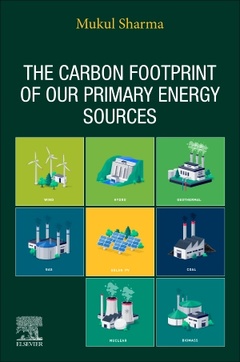Description
The Carbon Footprint of our Primary Energy Sources
Author: Sharma Mukul
Language: English
500 p. · 15x22.8 cm · Paperback
Description
/li>Contents
/li>Biography
/li>Comment
/li>
The Carbon Footprint of our Primary Energy Sources supplies readers with a comprehensive, accessible analysis of the carbon footprints of a range of primary energy sources including crude oil, natural gas, coal, solar energy, wind energy, geothermal energy, hydroelectric energy, nuclear energy and biofuels, and their carbon footprints, employing a full lifecycle assessment (LCA) of each primary energy source. This text, along with its accompanying interactive calculator, furnishes both the foundation and a tool for estimating carbon footprints for a range of energy systems. The work culminates in a cost-benefit analysis of these primary energy sources. With the significant uptick of global investment in alternative energies and the global focus on reducing emissions, this text delivers an important foundational overview/understanding of these systems, and an opportunity for teachers and readers to apply learnings to their own energy consumption choices.
2. The carbon footprint of crude oil
3. The carbon footprint of natural gas
4. The carbon footprint of coal
5. The carbon footprint of solar energy
6. The carbon footprint of wind energy
7. The carbon footprint of geothermal energy
8. The carbon footprint of hydroelectric energy
9. The carbon footprint of nuclear energy
10. The carbon footprint of biofuels
11. The carbon footprint of energy consumption sectors
12. A cost-benefit analysis of our primary energy sources
Dr. Sharma is a member of the US National Academy of Engineering, and Honorary Member of the Society of Petroleum Engineers (SPE), recipient of the John Franklin Carl Award and Lucas Gold Medal, SPE’s highest technical awards. He is also a recipient of SPE’s Faculty Distinguished Achievement Award, Lester C. Uren Award and Formation Evaluation Award. He has served as an SPE Distinguished Lecturer, on Editorial Boards of many journals, taught and consulted for companies worldwide.
- Presents foundational information about various energy systems
- Quantifies the estimated extent of carbon footprints of various energy sources
- Raises awareness among readers of their energy consumption and energy emissions
- Equips readers to calculate the carbon footprints of various energy sources<
- Empowers readers to make informed energy decisions that support the reduction of carbon emissions
These books may interest you

The Future of Energy 85.01 €



